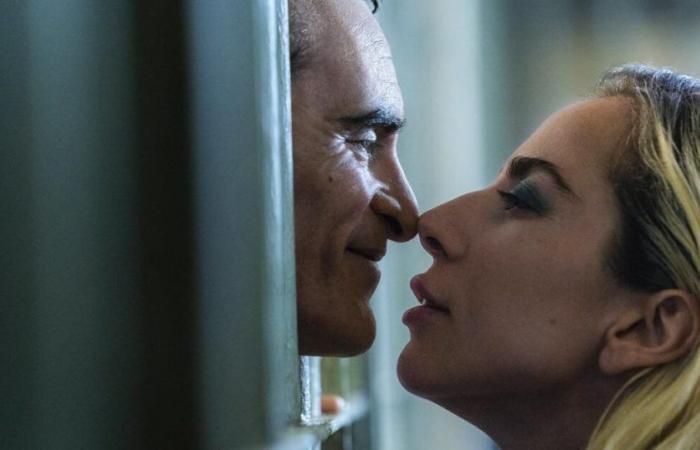Folie à deux — a shared madness — is a natural theme for a musical romance between Batman characters, but in Todd Phillips’ fitfully paced sequel to his 2019 megahit “Joker,” the first question you’ll have is: Who are the two in this madness? Is it Joker and Harley Quinn? Arthur Fleck? Someone else? While momentum issues and a general heaviness dog the movie, it does offer up some interesting possible answers, none, though, to the general question of: What did I just watch and why?
Co-scripted by Phillips and Scott Silver, “Joker: Folie à Deux” picks up two years after “Joker,” with Arthur Fleck (Joaquin Phoenix reprising his Oscar-winning role) at Arkham Asylum, awaiting trial for his many crimes. The action is prefaced by a Looney Tunes-ish cartoon entitled “Me and My Shadow,” depicting Arthur bedeviled by his own shadow, which is more powerful than he is. It both presages the movie’s musical bent and works as a metaphor for the unconscious and often unacceptable parts of ourselves. Arthur’s dedicated lawyer (Catherine Keener in yet another intelligent, empathetic turn) is preparing a “shadow” defense: Arthur is innocent by reason of insanity because Joker is a separate personality within him.
That’s one of the film’s possible duos. Soon, though, Arthur will meet fellow inmate Harleen “Lee” Quinzel (Lady Gaga), this movie’s version of Harley Quinn, previously played by Margot Robbie in “Suicide Squad,” “The Suicide Squad” and “Birds of Prey.” These crazy kids love music and talking about killing their parents. The rest of the plot concerns Arthur’s trial, prosecuted by Gotham’s preening Assistant District Attorney Harvey Dent (Harry Lawtey). Oh, and there are songs. Lots and lots of songs.
Lady Gaga and Joaquin Phoenix in the movie “Joker: Folie á Deux.”
(Niko Tavernise / Warner Bros. Pictures)
“Folie” is every inch a sequel to “Joker,” told in the same heightened cinematic language, with key collaborators returning. Cinematographer Lawrence Sher captures arresting images: Arthur’s reaction to Lee drawing a lipstick smile on glass; or Arthur and Lee exchanging cigarette smoke through prison bars. Phoenix is as intensely committed as we’ve come to expect and Gaga is convincing as a deranged superfan. But the biggest change, of course, is that they frequently burst into song — sometimes it’s less bursting than leaking — plumbing the Great American Songbook for the likes of “That’s Entertainment!” and “Bewitched (Bothered and Bewildered).”
There are 11 songs on the soundtrack album and more than that in the movie, presented in full or in pieces. The numbers sometimes serve a narrative purpose, other times not so much. The performers are game, but these musical breaks try our patience. They often interrupt the momentum, and there’s not much of that to begin with, with no attempt to create suspense regarding the verdict or any grand plan Arthur or Lee might hatch. That lack of mirthful masterminding reminds us, painfully, that this isn’t anything close to “Joker.”
The 2019 film bore a closer resemblance to a bastard child of “Taxi Driver” and “The King of Comedy” (Robert De Niro was even in it) than to any traditional origin story, Phillips clearly more interested in springing off a Martin Scorsese template than a DC one. (In the sequel, a judge character looks suspiciously like Scorsese.)
So what, apart from another billion-dollar gross, motivates the second film? Audiences will wonder that for almost the entirety of “Folie à Deux,” which mostly flails in fits and starts until a tour-de-force sequence in which Arthur/Joker serves as his own lawyer. That’s Phoenix at his best and the film at its best. It’s hilarious and strange and menacing in just the right way — and a shot in the arm for a somewhat laggard comic-book movie. But those waiting to see Arthur develop into the insane Joker of lore will do so in vain. That’s not what this one is about, either.
It’s also not about the romance, which isn’t deeply explored. The film seems more concerned with what others — the media, the throngs outside the courthouse — expect Joker to be. It’s so detached from the supervillain narrative that it’s almost meta. But as the musical numbers become lengthy detours rather than lending further insight into Arthur, the sequel doesn’t sing as a character study. And it sure ain’t a thriller.
‘Joker: Folie à Deux’
Rating: R, for some strong violence, language throughout, some sexuality, and brief full nudity
Running time: 2 hours, 18 minutes
Playing: In wide release






